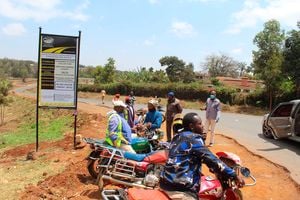Joy as West Pokot gets first technical institute since independence

Tuition fees are also highly subsidised.
It is 6am and Selina Chepurai, a 32-year-old mother of two, is busy climbing hills and wading through thickets on her way to school.
The Kitakakapel Technical Training Institute is located a few kilometres from her home.
In tow are her two children, who are heading to Kitalakapel Primary School, adjacent to the new institute.
For Ms Chepurai, the joy of heading to school with her children before she branches off to the institute isn’t the best part of her journey.
She was married off at a young age, just after completing primary school. She is now on her way to achieving her dream of becoming a librarian, thanks to this college, the first of its kind since independence in the expansive West Pokot County.
It is a similar story for 45-year-old Stephen Pkemoi, who now has a chance to practise his building technology craft at the new institute.
Having scored a D-plain in his Kenya Certificate of Secondary Education (KCSE) in 2017, Mr Pkemoi’s dreams appeared to be over, because he had no money to enrol in a technical institute far from his home.
Mr Pkemoi, whose firstborn son is in Standard Eight, hopes people like him and his son now have a chance to fulfil their dreams after the new institute opened its doors.
Sitting on 30 acres that used to be a battlefield for banditry and cattle rustling, the institute in Kapenguria constituency has now become the face of renewed peace in the area.
As if that is not enough, the college boasts the only processing plant in the region.
“We can process milk and meat. Our machines also process fresh juices, which we can sell at low prices to help run the institute,” said Principal John Kibowen.
The school, which offers courses like general agriculture, ICT, library studies, masonry, social work, community development and business studies, has registered 120 students.
Tuition fees are also highly subsidised.
Vocational education
As part of its promotion of technical and vocational education, Mr Kibowen says, the national government pays 70 percent of the fees. Students also have access to constituency development funds as well as bursaries from the county, lifting the weight of the otherwise punitive fees.
“We intend to start new courses that will take three months, to incorporate school leavers and dropouts who want to gain some technical skills,” Mr Kibowen said.
The institute has just been connected to electricity and was drilling a borehole to ensure a constant supply of water.
Abraham Domong’ole, a confessed reformed warrior, was one of the students admitted in the first batch in May.
“I wasted my time stealing cattle from Turkana and Karamoja and engaging in banditry. I dropped out of school while in Standard Seven and now I want to pursue my dream of being a mechanic,” said Mr Domong’ole, 47.
Kapenguria MP Samuel Moroto was ecstatic about the possibilities provided by the institute, which is situated in his constituency.
“This is a new dawn for us after 58 years of dreaming,” Mr Moroto bragged.
Noting that the county had only six government polytechnics — against the target of one in each ward — with no university branch, Mr Moroto said students from the region travel long distances to seek knowledge.
“This technical institute has brought hope to our children who cannot afford to pay for higher education in private institutions. We are proud to have an institution of our own,” he added.
The MP said residents will also be prioritised in casual jobs, and appealed to those with land near the college to build hostels that will accommodate the students.
A slow economy
He urged locals to utilise the facility, keep animals for milk and cultivate crops, which they can sell to students, lecturers and employees.
“They will buy from local shops and patronise local hotels, which will benefit residents. Students will inject life into the quiet Kitalakapel that struggles with a slow economy,” he said.
He appealed to local Form Four leavers who are yet to enrol with any tertiary institution and who scored between C- and D- in their KCSE exams to enrol at the institute.
“We are very happy with the government for accepting to build for us the first college since the colonial period. This is history because the Pokot community has never got a public college,” Mr Moroto said about the significance of the institute.
The college, he noted, can admit 5,000 students, adding that it is a large school that the government has promised to elevate to a national polytechnic.
“West Pokot was a closed district and we have realised development during devolution. From 1992, the area was a banditry and cattle rustling zone but peace has resumed. We will fence off the institution with a wall and put up street lights in Kitalakapel,” the MP told the Nation.
Devolution Principal Secretary Micah Powon said the institute was an eye-opener for the entire region.
“It will be a game changer. The government has provided an opportunity for youths to get skills,” he said when he visited the area.
Riwo ward MCA David Alekulem said many students from the county who qualify to join institutions of higher learning seek admission outside the region.
“This college has brought hope to our children who cannot afford to pay fees in private institutions. We are proud to have an institution of our own,” he said.





